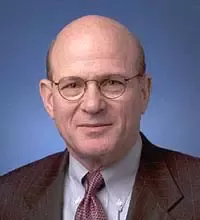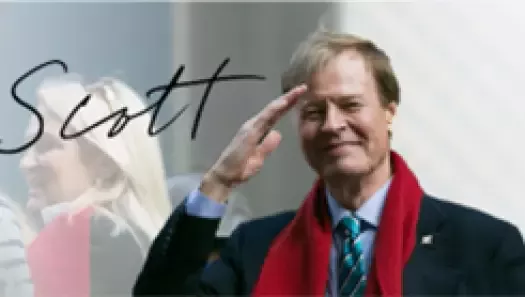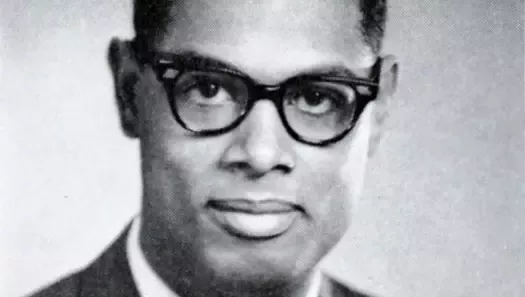WeSalute Awards
HeroVet Bob McFarland 'Powerman' Brings IT Skills, Integrity To VA As Chief Information Officer

When Bob McFarland retired from the Dell Computer Corporation in April, 2003, he and his wife were looking to slide into a life of ease. Bob was especially looking forward to doing some fly-fishing and snow skiing in Utah. "I think that that just about the best job a man can have," he said.
A telephone call, however, intervened. Bonnie Carroll, then White House liaison for the Department of Veterans Affairs, asked if Bob might be interested in applying for the post of Assistant Secretary for Information and
Technology. He was. Being a businessman first – he’d spent 33 years in the private sector – and a technologist second, he never thought he’d be offered the job. Much to his surprise, and delight, he was.
(That Bonnie Carroll reached out to Bob McFarland was no accident. Both had been profiled as "HeroVets" by Veterans Advantage. And Scott Higgins, founder and CEO of Veterans Advantage, had sung Bob’s praises to Bonnie, as Bob had served on Veterans Advantage’s Board of Advisors.)
With his wife’s assent, Bob decided to postpone his retirement and take on a relentlessly high-powered job for a single reason: "It gave me a chance to repay a debt I’ve owed for more than 40 years," he said. "The only agencies of government I’d even consider working for were the VA and the Department of Defense. Because in February 1963, the Army took an 18-year-old, restless, footloose kid and taught him the basics of living a respectable, responsible life."
The Most Positive Influence
As a young man growing up in east Texas and northeast Louisiana, Bob McFarland found himself drifting into manhood without direction. He spent more time "chasing skirts," he said, than focusing on his studies. He didn’t have much respect for authority, or an excess of discipline. He didn’t take school seriously.
Then he was drafted.
What Bob McFarland learned over the next two years transformed him from a boy to a man. He was given direction. He was force-fed discipline. For the first time in his life, he had to responsibilities to fulfill. The Army became "the most positive influence in my life," he said during a telephone interview.
Sent to Fort Belvoir, Virginia, for training as a "powerman," he gained a measure of expertise at setting up and keeping field generators running. At a time when the United States was quietly building up its forces in Southeast Asia, the skills at which he had become proficient were considered critical. At the conclusion of his schooling, he was whisked off to Vietnam. Literally. He was permitted one phone call to say so long to his family.
After a stint in Saigon with the 362nd Signal Company, 39th Signal Battalion, he was sent down to the Mekong Delta, attached to the 114th Aviation Company, Delta Provisional Aviation Battalion, based in Vinh Long. There, Bob McFarland "did my power thing and occasionally crewed on a Huey helicopter." He lived in a tent in primitive conditions. In a job not without hazards, he did a year’s tour and came home without a scratch. McFarland
Vinh Long (1963-64).
Home to the 114th Aviation Company
A few months before the first American combat troops arrived in Vietnam, Bob McFarland left the Army, his term of active duty completed. The lessons he had learned, however, have shaped the rest of his life.
A Solid Foundation
"The service taught me, number one, the importance of discipline, and number two, the value of teamwork," he said. "It also taught me honesty - that you have to be straight with people."
His military service, however, did not come with particularly lucrative GI Bill benefits. The $102 he received monthly for going to school was so meager he had to work if he didn’t want to drop out. After beginning his studies at Northeast Louisiana State College, he persevered, completing his undergraduate studies at LeTourneau University in Longview, Texas. He earned a bachelor’s degree in business management.
Bob McFarland, second from the right, about to board one of the 114th choppers
As he entered the business world, like most veterans he put his wartime experiences behind him. Some 15 years later, though, when the national Vietnam Veterans Memorial was unveiled in Washington, D.C., he took pride in his status as a Vietnam Veteran. When money was being raised to fund the construction of a Vietnam Veterans memorial in Texas, he gave, he said with modesty, and got his bank to stuff donation envelopes with the monthly bank statements sent out to all account holders.
Meanwhile, he was raising a family and working his way up the stepladder of success, advancing through senior executive positions with several domestic and international high-technology enterprises. At the pinnacle of his business career, he was vice president and general manager of the Government Sector at Austin-based Dell Computers.
McFarland had joined Dell in 1996 as vice president and general manager of the company’s Federal Business Segment. Under his stewardship, Dell became the premier supplier of computer systems to the federal government and initiated a major thrust into the Department of Defense market.
In the wake of the terrorist attack on 9/11, Bob and his team were able to marshal and channel all the resources at their disposal to aid the Pentagon and the City of New York. They contacted key people in Washington and New York as the grim and grisly task of digging out of the rubble had just begun, McFarland asked simply: ‘What do you need?’ They told him: notebooks.
At his behest, and with the full backing of Michael Dell and the top brass at Dell, production was ratcheted up, with emergency orders pushed to the head of the assembly line and government needs prioritized. Fulfilling their needs became the focus of Bob McFarland’s life. Because all flights were grounded for four days, he and his team rented a fleet of 18-wheelers, each with two drivers, and within 24 hours began to ferry the vitally needed computer supplies, round the clock, to DoD and New York City.
Within two days, the company had shipped 10,000 systems, including parts, servers, and desktops as well as laptops to replace the Dell equipment destroyed in the attacks. And some four dozen Dell employees from around the country drove to Washington and New York to get the computers operating in other government office buildings and warehouses.
Later, in the calm after the storm, the Army recognized Dell’s contributions. Major General George A. Higgins, then Deputy Commanding General of the Army’s III Corps and of Fort Hood, Texas, presented a plaque to Michael Dell.
"Dell’s persistent focus on its customers helped the Army and other Department of Defense offices restore full operational capability quickly in the aftermath of this unprecedented attack on our nation’s military headquarters," Higgins said. "And for this the soldiers and leadership in the United States Army convey their deep gratitude and respect."
While Michael Dell was pleased, Bob McFarland was more than gratified.
Challenging Bureaucracy
Bob’s nomination as Chief Information Officer was officially announced by VA Secretary Tony Principi – who also was profiled as a "HeroVet" by Veterans Advantage – last October 14th. The Senate held his confirmation hearing a scant two weeks later, and he was sworn in on January 30th. (A formal swearing-in was held on March 22nd.) No stranger to 12- and 14-hour days, he has taken on the challenge of his new post with determination and vigor.
"We’re looking to centralize some of our infrastructure functions to achieve better performance while conserving cost," he explained. The goal of improved IT functions and other economies of operation, he noted, is to reduce duplication of effort to make more dollars available in a leaner, more "veteran-centric" VA. (With more than 230,000 employees, the VA is the second largest department in the federal government.)
"You can say what you want about government," he said, "but here, everybody cares about the end result: Did we do the right thing by the veterans we serve?" To help serve them better, he acknowledged the challenge of getting the "intermediate bureaucracy" to buy into innovations. But, he added, "if you push the right buttons, you’ll get the right results."
Of course, change does not happen overnight. His goal, Bob said, is to achieve real change – to develop and implement plans that go beyond any single administration. "Whether I’m here for the next ten months or the next four years," he said, "I want to put in place systems that will endure, systems that whoever comes behind me with agree with my approach."
Then he can go off fly-fishing and snow skiing knowing that his debt of gratitude has been paid in full.



